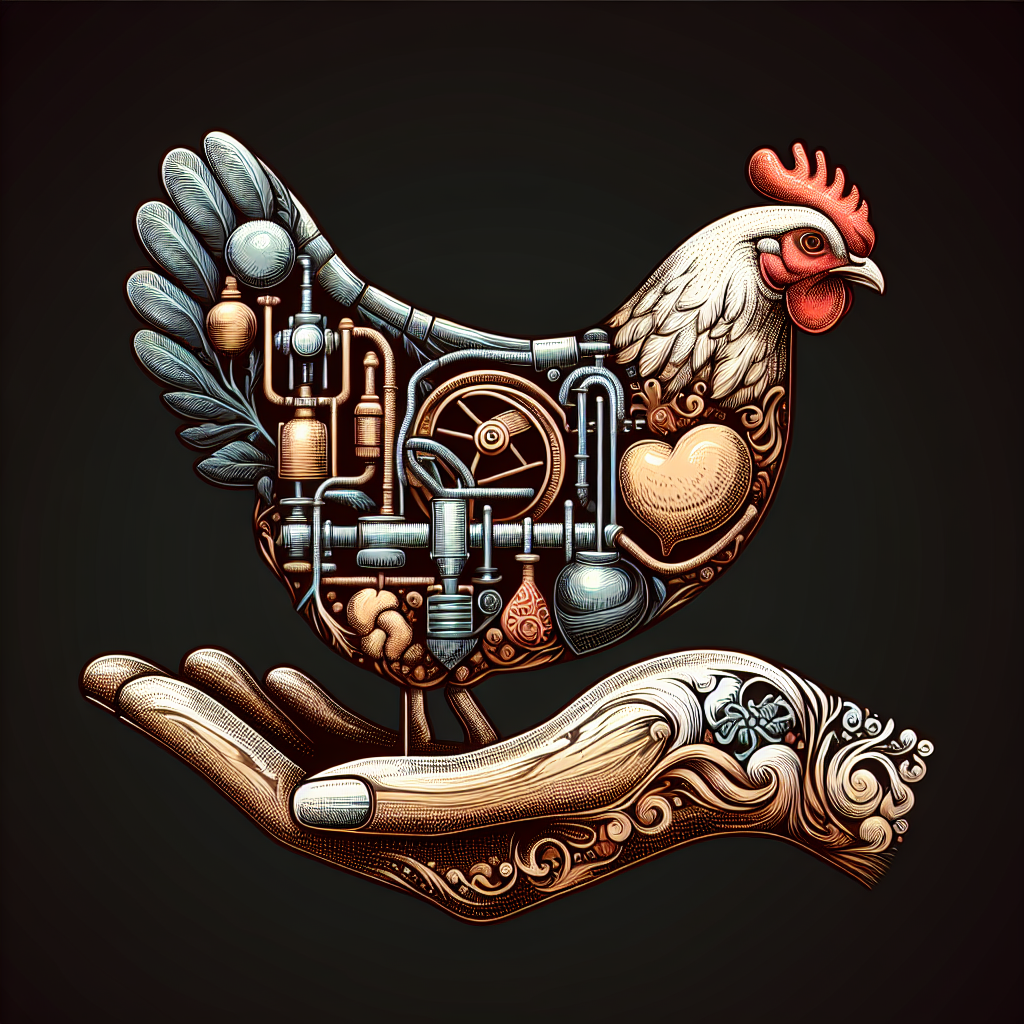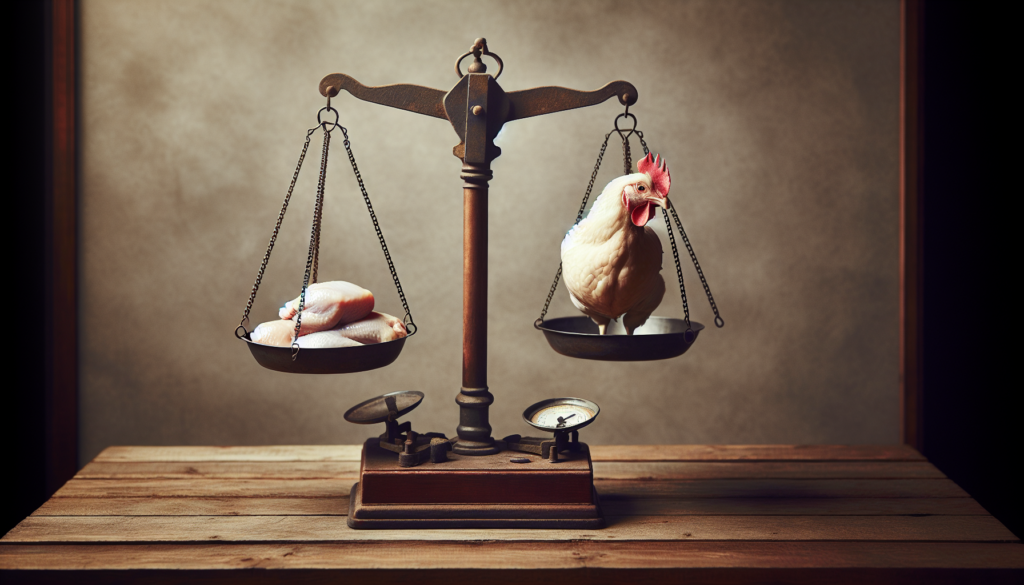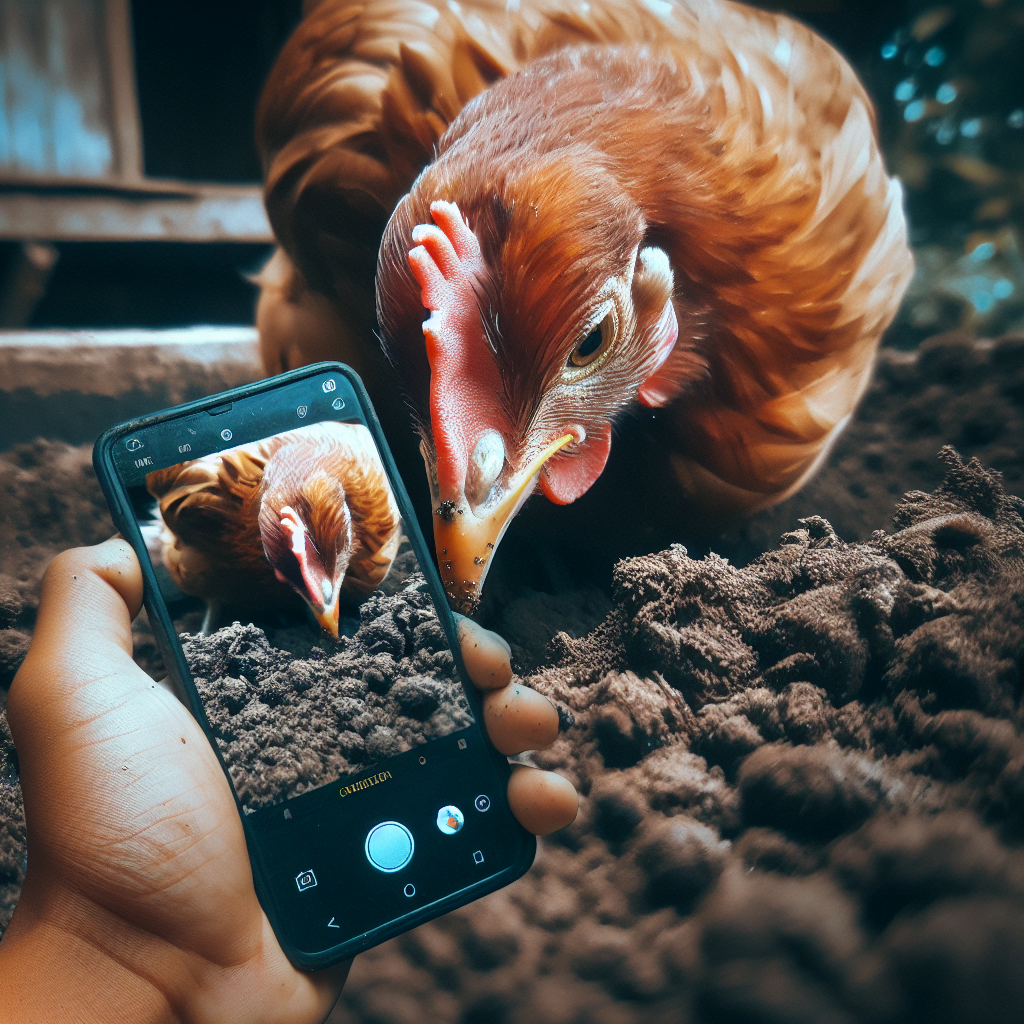In the world of animal agriculture, ethical considerations play a crucial role in shaping farming practices and consumer choices. But when it comes to poultry farming, how do these considerations compare to those for other livestock? From the treatment of animals to environmental impact, this article explores the distinct ethical factors that come into play in the poultry industry and examines how they stack up against the considerations for other types of livestock. As we delve into this thought-provoking topic, you’ll gain a deeper understanding of the unique challenges and responsibilities faced by poultry farmers, all through a lens of friendly curiosity.
Overview of Poultry Farming
Introduction to poultry farming
Poultry farming is the practice of raising domesticated birds, such as chickens, ducks, and turkeys, for the purpose of producing meat, eggs, or feathers. It is an essential part of the agricultural industry and provides a significant source of protein for human consumption. Poultry farming has gained popularity worldwide due to its efficiency in food production, relatively low input costs, and fast growth rates of poultry birds.
Types of poultry birds
There are several types of poultry birds commonly raised in poultry farming. Chickens are the most popular and widely raised bird species, known for their white or brown meat and large-sized eggs. Ducks, on the other hand, are valued for their flavorful meat and eggs. Turkeys are predominantly raised for their meat, particularly during festive seasons. Additionally, there are other less common poultry birds, such as quail and guinea fowl, which are reared for their unique qualities and niche markets.
Importance of poultry farming
Poultry farming plays a crucial role in meeting the growing demand for animal protein worldwide. The consumption of poultry products, such as chicken meat and eggs, has steadily increased due to their affordability, versatility, and nutritional value. Poultry farming also contributes to the local and global economy by providing employment opportunities, supporting related industries, and ensuring food security. Moreover, poultry farming allows for efficient land utilization compared to other livestock farming practices.
Ethical Considerations in Poultry Farming
Animal welfare and living conditions
Animal welfare is a significant ethical consideration in poultry farming. Providing birds with proper food, water, shelter, and adequate space to move and express natural behaviors are essential components of good animal welfare. Practices such as overcrowding, confining birds to cages or small spaces, or failing to meet their behavioral and physiological needs can cause unnecessary suffering and stress. Ensuring humane handling and minimizing pain and distress during transport and slaughter are also important ethical considerations.
Use of antibiotics and growth hormones
The use of antibiotics and growth hormones in poultry farming is another ethical concern. Antibiotics are often administered to poultry to prevent and treat diseases, but their excessive or indiscriminate use can contribute to the emergence of antibiotic-resistant bacteria, posing a risk to human health. Similarly, the use of growth hormones to promote faster growth and increase meat production raises concerns about potential adverse effects on animal health and welfare. Stricter regulations and monitoring are necessary to ensure responsible use of antibiotics and to limit the use of growth hormones in poultry farming.
Environmental impacts
Poultry farming, like other livestock farming practices, has environmental impacts that need to be considered. One significant concern is the disposal and management of poultry waste, which can contribute to water and air pollution if not properly handled. The excessive use of pesticides and fertilizers in poultry feed production can also have detrimental effects on ecosystems. Proper waste management, adopting sustainable farming practices, and minimizing the use of harmful chemicals are important steps in mitigating the environmental impacts of poultry farming.
Genetic manipulation
Genetic manipulation in poultry farming involves selective breeding and genetic modification to enhance desirable traits in birds, such as growth rate and disease resistance. While selective breeding has long been practiced, genetic modification is a more recent development in the industry. Ethical considerations arise in terms of animal welfare and potential unforeseen consequences on bird health and behavior. Proper regulation, transparency, and scientific evaluation of genetic manipulation techniques are essential to ensure the ethical and responsible use of these technologies in poultry farming.
Comparing Ethical Considerations with Other Livestock
Animal welfare standards
When compared to other livestock, poultry farming often faces more scrutiny regarding animal welfare standards due to the intensive nature of production. While efforts have been made to improve conditions, issues such as overcrowding and confinement are more prevalent in poultry farming. However, advancements in housing systems, such as enriched cages or free-range systems, provide better living conditions for poultry birds.
Living conditions and confinement
Poultry farming generally requires less space compared to other livestock. Rearing chickens in intensive indoor systems, such as battery cages, is a common practice due to its efficiency in space utilization. However, this confinement can restrict the natural behaviors of birds and impact their welfare. In comparison, larger livestock, such as cattle or pigs, often have more spacious housing options, such as barns or outdoor grazing areas, allowing for a greater range of movement.
Use of antibiotics and growth hormones
The use of antibiotics in poultry farming is more prevalent compared to other livestock. The intensive production systems and high stocking densities in poultry farms make them more susceptible to disease outbreaks, necessitating the use of antibiotics. On the other hand, the use of growth hormones is less common in poultry farming, as birds already exhibit rapid growth rates. In comparison, both antibiotics and growth hormones are utilized in other livestock farming practices, although regulations vary by country.
Environmental impacts
The environmental impacts of poultry farming, such as waste management and pollution, are comparable to those of other livestock farming practices. All livestock produce waste that must be managed properly to mitigate environmental risks. However, the scale of poultry farming allows for the adoption of specialized waste management systems, such as anaerobic digesters or composting facilities, to reduce environmental impacts. Furthermore, the smaller land footprint of poultry farming reduces habitat destruction compared to larger livestock.
Genetic manipulation
Genetic manipulation is a common practice across various livestock industries. While poultry farming incorporates selective breeding and genetic modification, other livestock sectors, such as cattle or pig farming, also use similar techniques to improve traits. The ethical concerns surrounding genetic manipulation, such as potential health implications and welfare considerations, are shared across these industries. Close monitoring, stakeholder engagement, and adherence to regulatory frameworks are essential to ensure ethical practices in all livestock farming.
Animal Welfare Standards
Minimum requirements for poultry
To ensure proper animal welfare in poultry farming, there are minimum requirements that must be met. These include providing birds with adequate space for movement, access to clean water and appropriate food, proper lighting conditions, and suitable environmental enrichment. Additionally, measures such as regular health checks, disease prevention, and appropriate therapeutic interventions are necessary to maintain the welfare of poultry birds.
Comparative standards for other livestock
Animal welfare standards for poultry farming are often more stringent compared to other livestock industries. This is due to the higher level of scrutiny and public perception surrounding intensive poultry farming practices. Regulations and industry standards for other livestock, such as cattle and pigs, also exist to ensure animal welfare, but continuous improvement and adaptation to evolving scientific knowledge are essential in all sectors to meet ethical considerations.
Living Conditions and Confinement
Cage systems in poultry farming
Cage systems are commonly used in poultry farming to house birds, particularly in intensive production systems. Different types of cage systems, such as battery cages or enriched cages, vary in terms of space allowance and amenities provided to birds. While cage systems have been criticized for restricting natural behaviors and limiting space, advancements in cage design, such as the introduction of perches and nesting areas, aim to improve bird welfare.
Compared to housing options for other livestock
In comparison to other livestock, such as cattle or pigs, poultry farming generally requires less space for housing and confinement. Larger livestock often have access to outdoor grazing areas or larger indoor pens, allowing for greater freedom of movement. However, it is important to note that providing sufficient space and environmental enrichment is crucial for the well-being of all livestock, regardless of the specific farming system employed.
Use of Antibiotics and Growth Hormones
Regulations governing the use of antibiotics in poultry
The use of antibiotics in poultry farming is strictly regulated in many countries. These regulations aim to ensure responsible use and prevent the development of antibiotic-resistant bacteria. Antibiotics in poultry farming are typically used to treat diseased animals or prevent the spread of illness. Additionally, pre-harvest withdrawal periods are established to ensure that antibiotic residues in poultry products remain within safe limits for human consumption.
Comparison with other livestock
The use of antibiotics varies across livestock industries. Poultry farming often requires the use of more antibiotics due to the susceptibility of birds to diseases in intensive production systems. However, the overall use of antibiotics in other livestock sectors, such as pig and cattle farming, can also be significant. The development of antibiotic stewardship programs and the adoption of alternative management practices play a crucial role in minimizing antibiotic usage across all livestock farming sectors.
Environmental Impacts
Waste management and pollution in poultry farming
Proper waste management is vital in poultry farming to minimize environmental pollution. Poultry waste, including excrement, feathers, and bedding materials, can pose risks if not handled appropriately. Best management practices, such as utilizing anaerobic digestion systems to produce biogas or implementing composting techniques, help to mitigate environmental impacts and utilize the nutrient content of poultry waste efficiently.
Comparing environmental impacts with other livestock
The environmental impacts associated with poultry farming are similar to those found in other livestock farming practices. All livestock farming generates waste that must be managed to prevent water and soil pollution. However, the scale of poultry farming allows for specialized waste management systems, minimizing the impact on the environment. Additionally, poultry farming’s smaller land footprint reduces deforestation and habitat destruction compared to larger livestock farming systems.
Genetic Manipulation
Selective breeding and genetic modification in poultry
Selective breeding and genetic modification are common techniques employed in poultry farming to improve bird productivity and enhance desirable traits. Selective breeding aims to produce offspring with specific characteristics, such as increased growth rate or egg production, over several generations. Genetic modification involves introducing specific genetic material into the bird’s DNA to achieve desired traits like disease resistance or improved feed conversion efficiency.
Comparison with genetic manipulation in other livestock
Genetic manipulation techniques, including selective breeding and genetic modification, are utilized across various livestock farming sectors. The objective is to enhance productivity and welfare while meeting market demands. These practices face similar ethical considerations across all livestock industries, emphasizing the need for responsible use, transparency, and adherence to scientific evaluation to ensure the well-being of animals and minimize potential risks.
Consumer Perception and Demand
Awareness of ethical concerns
Consumers are increasingly becoming aware of the ethical concerns associated with livestock farming, including poultry farming. Concerns related to animal welfare, antibiotic use, environmental impacts, and genetic manipulation have led to an increased demand for more sustainable and ethically produced poultry products. This heightened awareness has prompted consumers to seek out labeling schemes and certifications that indicate higher animal welfare standards and responsible farming practices.
Preference for certain farming practices
Consumer preferences for certain farming practices in poultry farming vary. While some consumers may prioritize free-range or organic poultry products to ensure higher animal welfare standards, others may prioritize affordability or product quality. Understanding consumer preferences and providing transparent information about farming practices can help poultry farmers cater to the diverse demands of consumers and build trust in the industry.
Regulatory Frameworks and Industry Standards
Existing regulations for poultry farming
Poultry farming is subject to various national and international regulations that aim to ensure animal welfare, food safety, and environmental protection. These regulations encompass areas such as biosecurity, waste management, use of antibiotics and growth hormones, and labeling requirements. Compliance with these regulations is essential for maintaining industry standards and protecting the welfare of poultry birds and consumers.
Comparison with regulations for other livestock
Regulatory frameworks for other livestock industries also exist to address ethical considerations and environmental impacts. However, there can be variations in regulations and enforcement across countries and regions. Harmonizing and improving regulatory standards globally can help establish consistent ethical practices throughout the livestock industry and ensure the well-being of animals and the environment. Collaboration between regulatory agencies, industry stakeholders, and consumer advocacy groups is crucial in achieving these goals.




